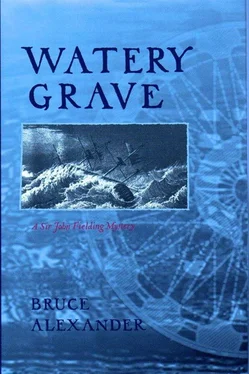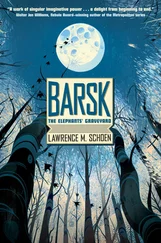In cross-examination, the barrister tried to suggest that the two villains would never talk so openly before others.” Why should they do such a stupid thing as that, Mr. Singh?”
“Because they think we only Inja boys and cannot understand English. But I understand all they say. Oh yes.”
Then came Seth Tarkin, the innkeeper of the Green Man, to tell his Judas role in Hartsell’s murderous enterprise. He told also that Mr. Boone was next the captain when he made his inquiry regarding Black Emma’s lodgings.
Next, of course, Emma Black was called — she the most important of all to the case, for hers was eyewitness testimony. And at that point, Sir Richard Calper played his last card.
“M’Lord,” said he, “I object to the appearance of this woman as a witness as she is a criminal, currently and actively engaged in crime. She is a known whore, m’Lord. She was called such by the last witness. Prostitution is a crime, and therefore she is a criminal.”
The Lord Chief Justice was forced to give this some consideration, yet it ended in this colloquy between judge and witness.
“Miss Black, are you currently and actively engaged in prostitution? You must remember that you are now under oath.”
“No sir, I am not. I am a resident of the Magdalene Home for Penitent Prostitutes, learning the trade of seamstress.”
“So you say you were a prostitute but are no longer. Is that so?”
“Yes, sir. If you knew the truth, half the women in London sold themselves one time or another, including the married ones. ‘
“While I suspect and hope your estimate is a bit high, I accept the principle of what you say, and I am satisfied you are not currently and actively so engaged. This witness may testify.”
And once she had done so. Captain James Hartsell was a doomed man. Then came Midshipman Albert Boone and made it all the more certain. He told of his visit to Old Isaac, what he had learned from him, and how the plan of murder had been hatched and executed. He told of their escape and confirmed their discussion of the crime on their return to the Adventure .
“You admit then that you were Captain Hartsell’s accomplice in this act?”
“I do, m’Lord, but I was only following orders.”
“Have promises been made to you for your testimony?”
“None sir, except Sir John, the blind one, said he would make recommendations.”
“He has done that. The court will take them under advisement when you are tried. You may step down.”
It is interesting to note that the matter of motive was brought up neither by the prosecution nor by the defense. The prosecution had no need to, since the weight of testimony against the captain was so strong. The defense did not challenge this, for of course the Navy had no wish to make his motive in all its details known in court as part of the public record.
The jury went out and returned within minutes. The verdict was guilty.
The Lord Chief Justice sentenced Captain James Hartsell to hang in two days’ time.
That afternoon, late, Sir John dictated a letter to Mr. Marsden and entrusted it to me to deliver. I ran most of the distance to Tower Hill and at the desk I was told that the admiral was still in his office but had left word that he was not to be disturbed under any circumstances. I had no choice but to leave the letter with the petty officer in charge.
What was in it? I know not for certain. I can only guess that in it he pointed out that now it was certain that his nephew had been convicted on the testimony of a perjurer and a murderer, for Captain Hartsell had been convicted. I am sure he made a final appeal for the life of Lieutenant Landon. Yet, as I say, I know not its contents for certain, since Mr. Marsden took Sir John’s dictation.
Midshipman Albert Boone was tried the following day. All the witnesses who had appeared at Captain Hartsell’s trial again appeared at Boone’s trial, with the addition of Old Isaac Tenker. Boone could simply have pled guilty and relieved them of this trouble, yet he insisted on pleading not guilty, with the defense he had simply been following the captain’s orders and had been made to help in what he knew to be a wrong and unlawful act. Yet he was convicted by the jury. And the judge who heard the case, who was not the Earl of Mansfield, took into consideration Boone’s testimony against his captain and followed the recommendation of Sir John Fielding. He condemned the convicted felon to transportation to the colony of Georgia and ten years’ hard labor there.
As fate had it, Lieutenant William Landon and Captain James Hartsell were hanged on the same day, August 1, 1769. By all reports, Captain Hartsell gave the better show. During his ride in the tumbrel to Tyburn Hill, he snarled, cursed, and spat at the jeering crowd. Pushed up upon the gallows platform, he kicked so vigorously at his executioner that his feet, too, had to be tied. Yet hanged he was, bobbing and choking on the rope, gasping until his tongue lolled from his lips. Lieutenant Landon, on the other hand, went to the gallows on Execution Dock with solemn dignity. He blessed the executioner and forgave all who had wronged him. He died, they say, like a true Christian gentleman.












